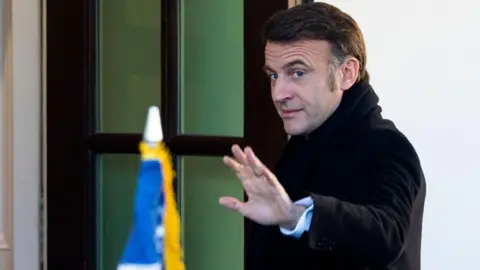Macron to warn Trump against looking weak to Putin

French President Emmanuel Macron is due to meet Donald Trump in Washington later, the first one-on-one meeting between the pair since the US president re-entered the White House.
Macron said in a social media Q&A that he would warn Trump against appearing weak to Russian President Vladimir Putin. It comes after the US held direct talks with Russia for the first time since Russia's full-scale invasion of Ukraine.
He is also due to present European proposals to achieve peace in Ukraine after the US president accused him of having "done nothing" on the matter.
The meeting takes place on the third anniversary of Russia's full-scale invasion of Ukraine. Other European leaders have been in Kyiv in a show of support.
On Thursday, Macron told a social media audience that Trump also needed to think about how his interactions with Putin would appear to other world leaders.
"It's not you, it's not your trademark, it's not in your interest. How can you then be credible in the face of China if you're weak in the face of Putin?" Macron said.
He added that he would seek to persuade Trump that the interests of the US and Europe were aligned, and that "if you let Russia take over Ukraine, it would be unstoppable".
That means any peace deal must be negotiated with Ukrainians and Europeans around the table, Macron said.
Such an appeal to the US president's ego is a conscious choice from Macron, who knows Trump from the latter's first term in power, Sebastien Maillard from the Chatham House think tank says.
"Macron is trying to touch on what could be more emotion than on pure rational arguments," Mr Maillard said.
Trump wants to appear as a strong man who got a peace deal quickly, he said, so Macron's strategy "is to demonstrate to Trump how weak he would look, he would not be the strong man he wants to be".
"If he treats Putin too kindly he will not be respected by China, Iran or other enemies."
More broadly, Macron's visit is likely to be part time-buying operation for Europe and part fact-finding mission, according to Mr Maillard.
"This is a last chance mission because Europe senses that things are hurrying up - they are afraid that this could be done too quickly and badly," Mr Maillard said.
He added that the international community was "bewildered" by this "new Putin-Trump axis", and that "Macron wants to understand what the future of Nato is".
"So that he is not taken by surprise at the next speech or next tweet," Mr Maillard added.
An advisor to Macron's office said that the French president would also use the meeting to present "proposals for action that reflect the convergences that emerged", AFP reported.

Those convergences refer to Washington's sudden policy shift in engaging Russia directly.
Within a month of taking back the White House, Trump had Putin on the phone and sent a delegation of US representatives to meet with Russian counterparts in Saudi Arabia.
Those talks resulted in an agreement to appoint teams from both countries to start negotiating the end of the war.
Russia also said it would not accept peacekeeping forces from Nato countries in Ukraine under any peace deal, a proposal that had ben raised a day earlier at a meeting of European members of Nato in Paris arranged hastily by Macron.
Macron's meeting with Trump comes ahead of UK Prime Minister Sir Keir Starmer's own visit, which is due on Thursday.
Like the French leader, Starmer has also been accused by Trump of having done nothing to end the war. The UK leader also responded to Trump calling Zelensky a "dictator" by saying he was his country's "democratically elected leader".
Both Macron and Starmer will be looking to present a united front to Trump to convince him against making decisions about Ukrainian and European security without involving Europeans, Mr Maillard said.
BBC






